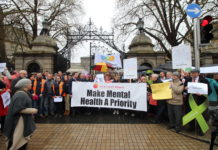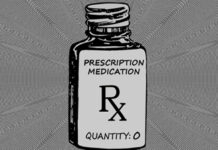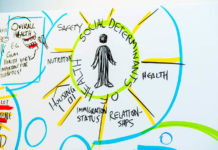Enough is Enough Series, #5 – The ADHD Fiction is Exposed. The French Have...
The time has come that the fictitious ADHD qualifies for my ‘Enough is Enough’ series. It’s time to stop addressing pharmaceutical psychiatry on its own terms: its fraudulent and corrupt 'science,' its spurious 'evidence base,' and its imaginary psychiatric ‘diseases.’ I’m done with this. The evidence is in. Let’s get real. Psychiatry has become a profession of drug pushers. As a psychiatrist I am beyond troubled. Let’s get real.
Case Study of Liberation Approach to International Mental Health Care
Study in Brazil demonstrates how the exploration of contextual determinants of distress in mental health care can inform therapeutic change.
Searching for Zen and Finding a Cow
If I had a clinical problem, why was something as ancient and simple as meditation helping me? And if normal positive human habits could be so profoundly useful, why the heck was the field marketing pills and “clinical” coping mechanisms to me instead? This frustration helped me jump ship from the medical mindset and hop into the world of humanity.
Defeating Goliath: Mental Health is a Social Justice Issue, and People with Lived Experience...
While I have lived just a few miles away from the Capitol for the last fifteen years, I have been unsure about getting involved in legislative advocacy. I’ve been intimidated by the complexity of the legislative process, and more inclined to leave it up to others who I perceive as having more experience than me. And honestly, I haven’t felt very hopeful about effecting change. My cynicism had turned to “learned helplessness.” And then along came a mental health bill so destructive, so regressive, that I had to step out of my uncomfortable comfort zone.
Human Connection is the Antidote to a Culture of Isolation
We need to burn through some darkness before we collectively see the light. The light is a palpable shift toward reaching for human connection; toward opening our hearts and our minds and intentionally focusing on the positive future that wants to emerge.
More to Happiness Than Feeling Good, Study Finds
Cross-cultural data suggest that happiness involves feeling the emotions one deems as right, in accordance with personal and cultural values.
Upon Leaving Soteria-Alaska
Soteria-Alaska, a program modeled after the highly effective Soteria developed in the 1970s by the late Loren Mosher, M.D., opened its doors in 2009. It is also impossible to convey the actual simplicity which in fact is the crowning jewel of the Soteria approach. A conservative review of the effectiveness of the Soteria approach revealed that it is at least as effective as traditional hospital-based treatment — without the use of antipsychotic medication as the primary treatment. Considering that people treated in the conventional way die on average 25 years younger than the general population, this is a substantial finding.
Traditional South African Healers Use Connection in Suicide Prevention
Study finds that traditional healers in South Africa, whose services are widely used by the country’s population, perform important suicide prevention work.
School Discipline is Racially Biased and Increases Misbehavior
School discipline that punishes minor misbehavior may increase adolescents’ misconduct and lead to racial inequalities in school discipline.
How Stigma and Social Factors Drive the Negative Health Outcomes Associated with Autism
A new study explores the interplay between social stress and quality of life for individuals self-identified with high-functioning autism.
How to Integrate Culture into Mental Health Care
Researchers explore how culturally responsive services can create greater equity in mental health care.
Loneliness Increases Risk of Severe ‘Common Mental Disorders’
Loneliness was found to both predict and be reinforced by severe common mental disorders.
Cast Aside No One
When I first presented my cards to the woman at Newport Hospital's front desk, I was greeted with a smile, but when I told her to whom I wanted them sent, her smile quickly faded. She sighed and asked me to consider handing out my cards to "the other patients" instead, as if the patients in the psychiatric unit didn't matter at all.
Six Ways You Can Really Help Prevent Suicide
The first time I tried to kill myself, I was 14. I won’t go into the indignity of being involuntarily locked up, time after time, until I satisfactorily convinced the staff that I wouldn’t harm myself or attempt suicide again. (I was lying.) The system taught me to lie, to hide my suicidal feelings in order to escape yet another round of dehumanizing lock-ups and “treatments.”
Post-Election Considerations for Users and Survivors of Psychiatry
A variety of scenarios of social and economic collapse have gone through many of our minds since Election Day. Insurance companies and pharmaceutical companies want to keep people on drugs, but what if there was no government subsidy for those who can’t pay?
Researchers Present Structural Competency Training Model for Psychiatrists
Researchers argue that a structural competency and social determinants of health approach must be made central to psychiatry training.
Parachute NYC Peer Support Program Presents Challenges and Opportunities
Anthropologists study Parachute NYC to identify challenges and opportunities for implementing peer support and Open Dialogue practices.
What Are Best Practices For Psychosis And What Gets In The Way?
Research investigates clinicians’ perspectives on best care practices and the complicated realities of providing care in the face of agency limitations and mechanized interventions.
Study Finds Racial Differences in Psychiatric Diagnosis and Treatment
Black patients are almost twice as likely as their white counterparts to be diagnosed with schizophrenia while whites are significantly more likely to receive a diagnosis of anxiety or depression, according to a recent study published in the journal Psychiatric Services. The researchers also found that the likelihood of receiving psychotherapy for any diagnosis (34%), regardless of race or ethnicity, was much lower than the likelihood of receiving a psychotropic medication (73%).
Psychologists Push For New Approaches to Psychosis: Part 2
The authors of the report expand upon the traumatic and sociopolitical factors underlying presentations of psychosis and “schizophrenia.”
Researchers Question the Utility of an ADHD Diagnosis
A new article examines the usefulness of the ADHD diagnosis and suggests alternatives
Exporting Psychological Concepts Associated With Gender May Have Unintended Consequences
New qualitative research finds a shift in the meaning of gender as it enters the local lexicon of people in rural Malawi, in turn having negative ramifications for those it is meant to help.
School-Based Program for Anxiety and Depression Shows Promise
Researchers evaluate the impact of a school-based prevention program on anxious and depressive symptoms.
Despite Increase in Treatments, Prevalence of Mental Health Issues Climbs
Findings show that despite increases in treatment availability, the prevalence of mental health issues has not decreased.
Mental Illness, Right & Wrong, Drugs, and Violence
The recent incident in the grounds of Washington Capitol, involving a young educated woman, brought shock to many people. It was another opportunity to blame a victim of mental illness and demand further restraint and medical attention for such individuals. Yes, we are lacking dignified, caring, discerning and attentive treatment for those whose spirits are broken. But we certainly don’t suffer from a lack of medical treatment for such individuals. It is time for policy-holders, and our scientific community to ask the 'heretical' question; “Could the drugs be the culprit behind the violence?”




























